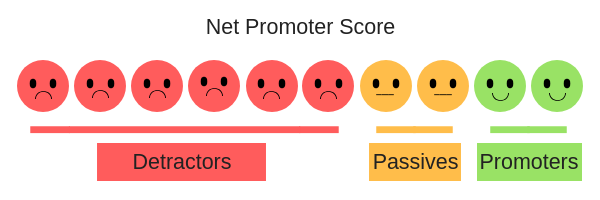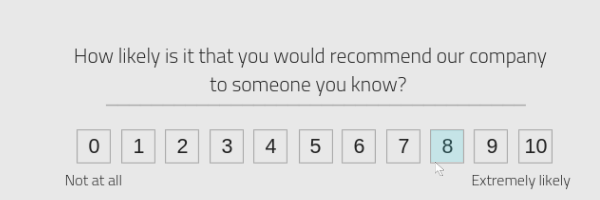Blog Sep. 19, 2018
What is a Net Promoter Score and How It Matters To Your Business

When you only have a handful of customers, it’s easy to determine if your customers are satisfied or not. However, when the numbers grow, it definitely becomes more difficult to keep in touch with your customer satisfaction levels.
If your company is interested in using online surveys to grasp the customer satisfaction level, Net Promoter Score (NPS) would be the best tool you are looking for.
Introduced in 2003, this simple survey question gauges overall customer satisfaction and loyalty based on their willingness to recommend a brand to others. In this article, we’ll explain what NPS is all about, how it works, and why it matters to your business.
What is Net Promoter Score (NPS)?
NPS is a survey that helps you determine whether your customers are willing to recommend your business to other potential customers. NPS shows the level of customers’ appreciation of the total efforts of the company, and is a metric used to scale customer satisfaction. NPS provides gain valuable information needed for strategies by enabling an understanding of the overall customer opinion to your brand.
The NPS survey asks one easy question, that is “How likely will you recommend us to someone you know?” Having one single question instead of a long survey also helps with the possibility of getting people to complete the survey, as well as simplify the results. Based on the responses collected with a rating scale of 0-10, the customers are be categorized into 3 types which are:

- The Promoters (score 9-10): This type of customer is happy, loyal, and satisfied. Promoters are more likely to buy a product or use a service from your company and introduce it to other potential buyers. If the number of promoters has been observed increasing, then there is a higher chance that this could fuel up your business and predict its growth as well.
- The Passive (score 7-8): Passives are the type of customers that are satisfied. However, they are also unenthusiastic customers who could easily switch to a competitor’s offer. Passives may not spread a negative word-of-mouth, but they are not a fan of your brand product or services to the extent that they will actually promote them.
- The Detractors (score 0-6): This type of customer would not spend their money on your brand again. Detractors are unhappy customers who would possibly damage your brand reputation and prevent growth through negative word-of-mouth. Detractors are the customer who will likely leave your brand and turn to your competitors.
How to calculate NPS?
NPS is usually calculated with online survey forms which companies generally send to customers at a regular interval:
How it works:


- Scores:
- Promoter: 10-9
- Passive: 8-7
- Detractors: 6-0
To properly calculate your overall Net Promoter Score, you’ll need to subtract the percentage of Detractors from the percentage of Promoters.
Net Promoter Score = % Promoters – % Detractors
So, for example, you have 100 customers who answered the NPS survey and here is the result:
Promoters: 60 responded with a score of 9 or 10.
Passives: 30 responded with a score of 7 or 8.
Detractors 10 responded with a score of 0 to 6.
Your calculation would look like this:
60% ー 10% = 50% NPS
The result of your NPS score will only range from -100 to 100, and so a score of 50% and above is an excellent rating. Whatever the outcome you may get, the result presents the loyalty of your customers and their willingness to recommend your brand to others.
If you are curious about knowing the average NPS score in the industry, take a look at sites like NPS Benchmarks.
Why can NPS predict whether your business is growing or breaking?
NPS helps you identify the health of your company. NPS allows businesses to measure and analyze the scores and opinions of each customer; and why they gave you the rating. The result will reveal why your detractors are having an unsatisfactory experience, what’s stopping passives to shift to promoters, and reasons why your promoters love your company.
Fred Reichheld, author of The Ultimate Question developed the Net Promoter Score methodology. He introduced NPS in order to quantify how well a company assists its customer and how likely a customer will return or remain loyal. Through implementing this method, Reichheld found out that whenever the customer answered this question with the score of 9 to 10, statistically they were more likely to continue buying a product or use a service from your business and/or refer your brand to others. In time, Reichheld discovered that companies that earned a good score in the NPS survey were more likely to grow than the companies that scored lower.
How can NPS help your business?
There’s a lot of different customer satisfaction surveys that are being implemented by companies, but NPS is definitely one that is simple and easier to answer. You can deploy the questionnaire with just a minute and assurance to get a very high response rate because it will not be a huge burden on respondents to answer a single question.
NPS is continuously improved and recommended to an enormous number of organizations around the world.
In adish, we ensure to help your company bringing delight with every connection. With our customer support professionals, we can turn your passive customers into promoters and decrease your detractors as well.
If you are starting to lose the beat of how satisfied your customers are, consider asking the one question you really need to know.
Net Promoter Score (NPS) is a powerful tool in weighing how satisfied your customers are, how loyal they are to buy again and/or refer your brand to their friends, and lastly predicts company health.








